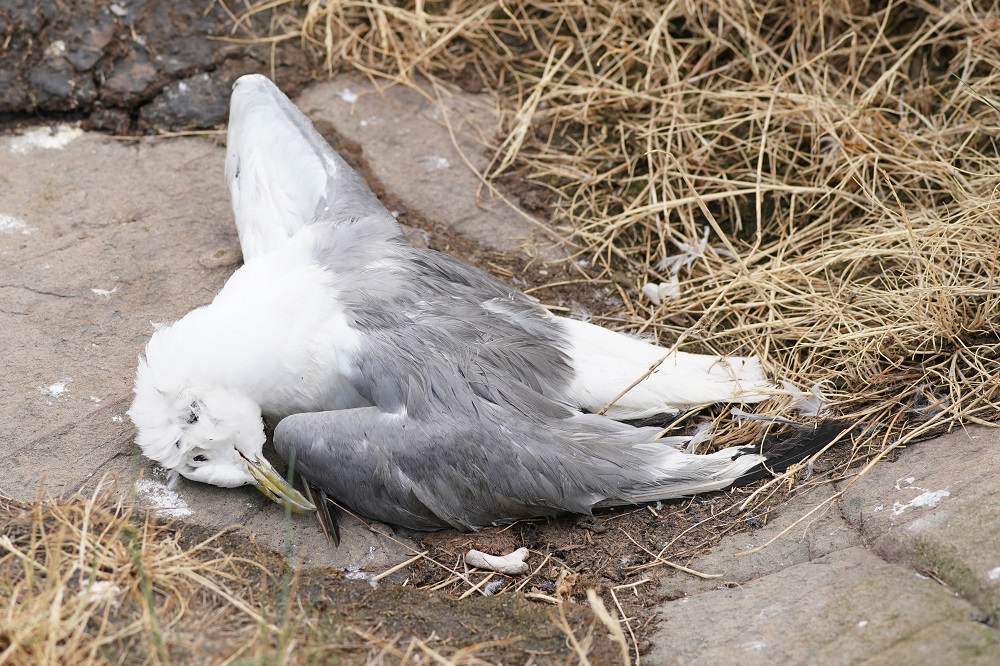Concern grows for Anglesey’s seabird colonies

Concern has grown for important seabird colonies off the coast of Anglesey as dead birds wash up on the beaches there following a suspected outbreak of bird flu.
RSPB Cymru have said the recent outbreak piles pressure on already fragile seabird population and the charity is now calling on the Welsh Government to publish a Seabird Conservation Strategy this year.
Several important seabird colonies in north Wales have been affected by the recent upsurge in cases of Highly Pathogenic Avian Influenza (bird flu).
The Skerries, a rocky islet off the north coast of Anglesey which is home to nationally important colonies of Arctic and Common Terns, is the latest to be hit.
The RSPB Cymru seasonal wardens working on the Skerries reported dead Common and Arctic Terns, as well as dead Herring Gulls and Puffins.
These deaths have been reported to Defra, and tests will be made to confirm whether the birds died from Highly Pathogenic Avian Influenza (H5N1), the prevalent strain of bird flu.
Although the numbers of infected birds remain small on the Skerries, RSPB Cymru are concerned about the situation as the birds in this important colony nest within close proximity to each other, therefore the chances of contagion within the colony is high.
Other seabird colonies in north Wales are experiencing similar difficulties.
Dead Arctic Terns have been recorded at an important location for seabirds off the coast of Rhosneigr.
RSPB Cymru staff, using full personal protective equipment (PPE) kit, have collected swab samples in order to confirm the cause of death as bird flu.
At RSPB South Stack, a significant number of Guillemots chicks and adults have been found dead and floating in the water.
There are also noticeable gaps on the cliff ledges where the Guillemots nest, and after recent monitoring, it’s likely there are 20% less Guillemots at South Stack, compared to the same time last year.
There are increasing reports of dead birds being washed up on nearby beaches off the western coast of Anglesey, and members of the public are advised to not touch or pick up any dead or visibly sick wild birds, and report to Defra using the online system.
Ecosystems
A significant number of Tern deaths has also been reported at Bae Cemlyn, Anglesey (managed by North Wales Wildlife Trust) as well as Shotton Lagoons on the Dee Estuary. RSPB Cymru staff have also reported a number of dead seabirds, including Herring Gulls, Guillemots and Shags on Ynys Seiriol (Puffin Island).
Arfon Williams, RSPB Cymru Head of Land and Sea Policy, said: “Seabirds are a key indicator of the overall health of marine ecosystems, but populations around the UK have fallen drastically in recent decades, including some in Wales.
“Sadly, threats to seabirds are increasing, driven by climate change and human activities at sea. Delivering conservation action for seabirds whilst they are at sea is challenging – it’s far better to reduce the threats they face. Therefore, carefully planning how human activities at sea take place, and where they take place, is vital.”
Last year in Wales, the Northern Gannet colony on Grassholm Island was hit by bird flu, with an estimated 5,000 birds dying.
This year, regular monitoring trips around the island, conducted by RSPB Cymru staff, seems to confirm that the island has avoided an outbreak so far, but the number of nesting birds is lower to the pre-bird flu number of 36,000 pairs.
A recent marine heatwave off the coast of the UK is likely to have had an impact on seabird populations as well, for example, by affecting food availability.
Recent sea temperature rises of 4-5°C above average for this time of year could pile added pressure onto already fragile populations, like our globally important seabirds.
Arfon Williams added: “The Welsh Government has committed to developing a Seabird Conservation Strategy. It is vital that this is published this year, with dedicated funding available to deliver the actions it identifies.”
Sick or injured wild birds should be reported to the RSPCA on 0300 1234 999.
Support our Nation today
For the price of a cup of coffee a month you can help us create an independent, not-for-profit, national news service for the people of Wales, by the people of Wales.





